This is an unnofficial translation of the article which was published in the 209th issue of the A Nova Democracia newpaper in Brasil
The Day of Proletarian Internationalism was full of protests and violent rebellions in several countries. Especially in France and Turkey, there was clashes between demonstrators and repression forces.
In Paris, the French capital, more than 55,000 demonstrators, thousands with faces covered - among students, youth and workers - took to the streets on a day of general rebellion. Large stores, banks, car shops and other monopoly facilities had their showcase destroyed. The young workers also called slogans like "Everybody Hates the Police!" and Paris, rebel !. The protest was called by unions to celebrate the First of May.
The imperialist government's response was again repression. More than 200 people were arrested by police officers who used tear gas and rubber bullets to try to disperse the demonstration, but without success. In response, vehicles form the shops and other objects were used as burning barricades. The frightened French press monopoly called the protests "a war scenario" and a "battle."
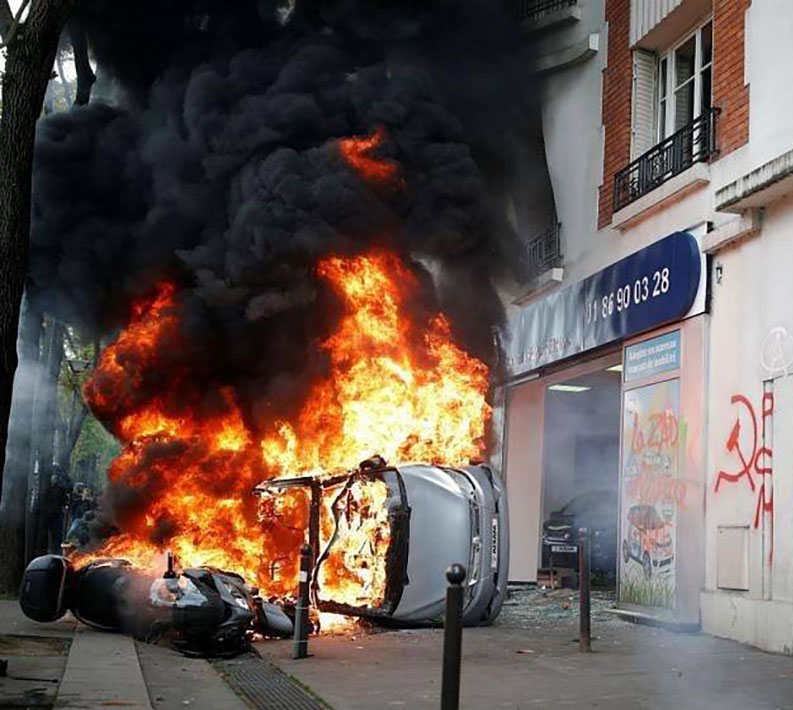
Government facilities were also set on fire as a way to repudiate the policies of reactionary President Emmanuel Macron. French protesters repudiate Macron's attempt to approve anti-people and anti-worker reforms, such as labor and social security, as well as other notorious ones such as educational reform.
In Colombia, students and young revolutionary activists marched through the streets of various cities of Colombia on May 1 - Proletarian Internationalism Day. Uniformized and raising the slogans Fight and resist! and Rebellion is justified !, the revolutionaries attacked banks and government buildings in Medellin. The actions are also part of Karl Marx's 200-year international celebration campaign. The information is from the popular and democratic newspaper El Comunero.
Especially in Medellin - the country's second largest city - the young revolutionaries and students, organized by the Student Movement Serving the People (Mesp), marched through the streets promoting actions and defying repression. The headquarters of a large national bank was attacked with stones in the center of the city. Communist flags, with the symbol of the hammer and sickle, were hoisted by the young. Some of them were dressed in shirts printed with the symbol of the Poor Peasants League of Brazil.
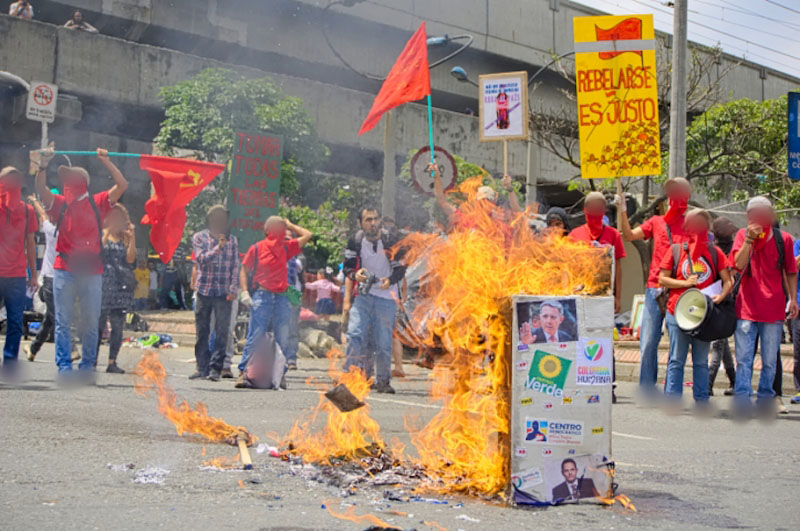
In rejection of the electoral farce and as part of the boycott campaign, the young revolutionary activists ignited a symbolic urn, stamped with photos of several politicians and electoral acronyms. A banner with the slogan Election no! Revolution yes! was erected next. A flag of the United States, the main enemy of the oppressed peoples of the world, was burned, and a flag of Israel had the same fate as an act of repudiation of the invasion and occupation of Palestine and support for that people's struggle against the Zionist genocide.
In Ecuador, hundreds of activists from the Front for the Defense of the People's Struggle (FDLP) organized a march celebrating the Day of Proletarian Internationalism on May 1, in San Miguel de Ibarra (province of Imbabura), 72 kilometers from the capital Quito. An obelisk - the city's main monument - was taken to be extended, in its place, to a banner honoring the 200 years of Karl Marx. At the end, pamphlets were dropped with explosives, marking the presence of revolutionaries on the streets of the city.
A big mass of workers, young people, students and women of the people dyed the streets red. The columns carried banners with the sickle and hammer, emblem of the Communist Party and the proletariat. In addition to celebrating the Day of Proletarian Internationalism, activists and masses repudiated the repression and militarization unleashed in the province of Esmeraldas, the precariousness of work, against unemployment and the government of the reactionary Lenin Moreno, in addition to claiming better wages.
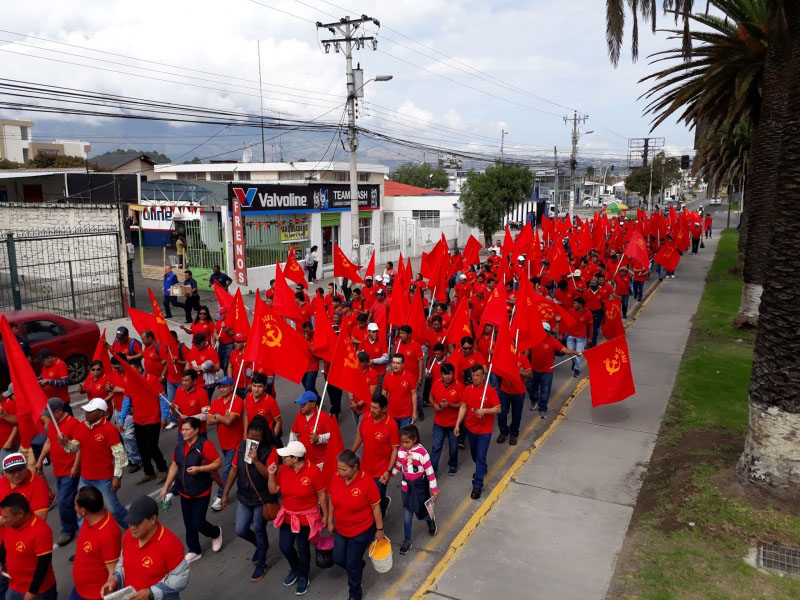
In the act the Ecuadorian newspaper New Democracy (Nueva Democracía, in the original) was launched In a statement, the FDLP described it as "a new instrument to the class struggle, the peasants and other poor and exploited masses," replete with "popular, democratic and anti-imperialist content." The launch of its first edition is part of Karl Marx's 200th anniversary celebration, notes the FDLP.
In Austria, in at least four cities, thousands of revolutionary activists and masses celebrated the Day of Proletarian Internationalism (May 1), the 100 years of the Communist Party of Austria and the 200 years of Karl Marx.
In Vienna, about 1,000 people attended a mass rally. A red block composed of Austrian revolutionaries honored the 200 years of Karl Marx and celebrated the centenary of the Communist Party of Austria (founded in 1918). A banner was hung with the slogan Everything to reconstitute the Communist Party of Austria!
The activists marched with a banner that raised the slogan All for the Revolution! All for the Revolutionary Party!. Alongside the red block, militants linked to the Communist Party of Turkey / Marxist-Leninist (TKP / ML) - who wage the people's war in their country - have also joined.
Similar demonstrations were held in Steiermark, Linz and Tirol, each counting at least 1,000 people.
In Brazil, there were several marches organized by trade union centrals. However, the combative march convened by the Workers' League in Belo Horizonte (MG) was proeminent on April 31. The event, which brought together class and combative entities, defended the need to prepare a vigorous General Strike for an indefinite period and celebrated the Day of Proletarian Internationalism.
The Revolutionary Front for the Defence of the People´s Rights (FRDDP), the Poor Peasants League (LCP), the Struggle for Socialism (LPS), the People´s Women's Movement (MFP), the Revolutionary People´s Student Movement (MEPR) The Red Unity - Revolutionary Youth League (UV-LJR), the Union of Postal and Telegraph Workers of Minas Gerais and the section of Vespasiano's Union of Workers in Education in Minas Gerais (Sind-UTE).
At the end of the demonstration, protesters lit red beacons and intoned at the top of their lungs slogans such as Go to combat without fear, dare to fight, dare to win! and others against the electoral farce and counter-reforms of the Temer / PMDB government.
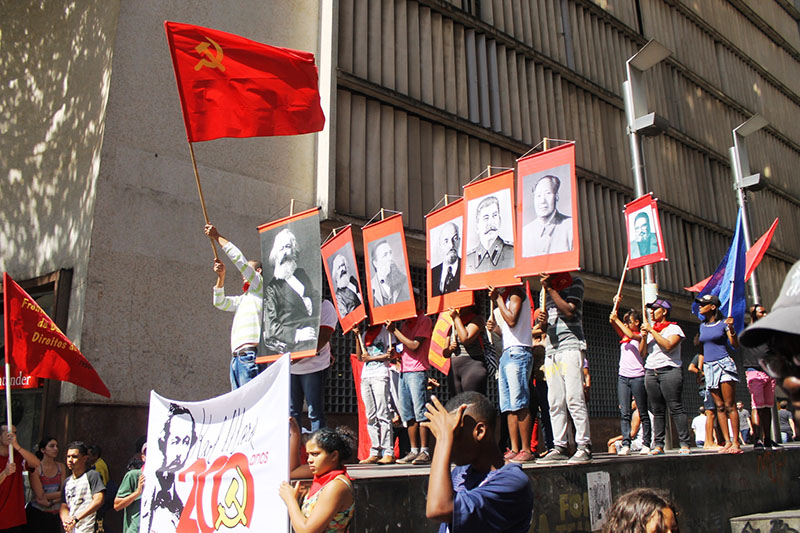
On May 5, dozens of workers, peasants, students, professionals and revolutionary activists realised an organized march in the central region of the same city.
Promoted by the FRDDP, the march had a huge banner bearing the seal of celebration of the bicentenary of Karl Marx, portraits of the great communist leaders Marx, Engels, Lenin, Stalin and Chairman Mao. Just behind, two great portraits depicted Chairman Gonzalo and the Brazilian Communist leader Pedro Pomar, as well as flags of the participating movements.
Among the flags, however, stood the red communist flag with the symbol of the hammer and sickle, which was ahead of all others.
In the capital of Chile, Santiago, a massive demonstration of International Workers' Day, convened by the Classist Workers Central, took to the streets late in the morning and faced police repression with decision.
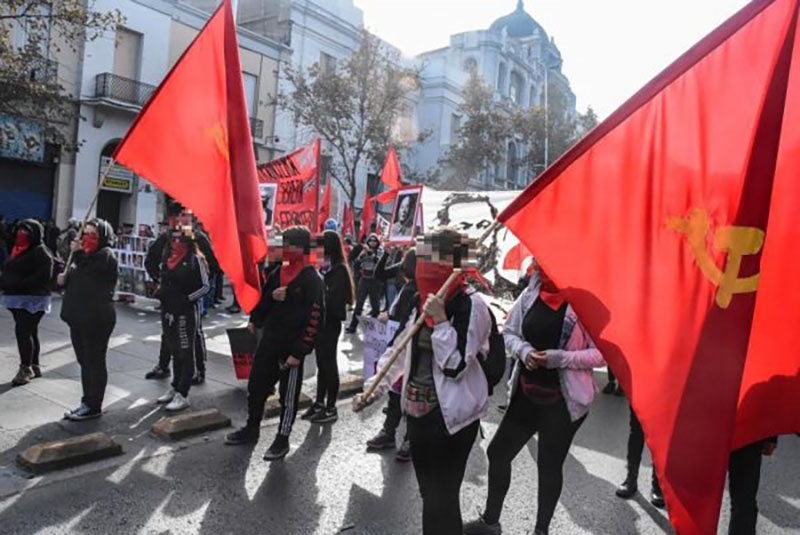
Thousands of young workers raised slogans against the exploitation and oppression perpetrated by the old state in the city and in the countryside and hoisted banners in celebration of the 200th anniversary of the great Karl Marx.
The Repression forces began their attacks on the demonstration with gas bombs and water jets at around noon, being promptly answered by the masses who hurled stones. Numerous burning barricades were erected along the streets of the Chilean capital and banks were also attacked by justified popular revolt. The manifestation of the Classist Workers Central was organized in opposition to the march of the CUT (Workers Single Central). In the streets, graffiti made by protesters with statements like The CUT does not defend you, denounced the role of class reconciliation that the entity has been playing.
In Turkey, there was also a great demonstration and repression. In Istanbul, capital of the country, a pitched battle was fought in the main square of the city, called Taksim. Recep Tayyip Erdogan's fascist government forbade any public demonstration to take place in that area, but the masses rejected their order.
Police surrounded the square in the attempt of stopping the protesters from entering it. At the cries of Long Live the First of May, the activists, especially young people, came forward to the confrontation. At least 45 people were injured and 50 were detained.
There were also protests in other parts of the world.
In the Philippines, large dolls, among them one with the image of the current president of the old semi-colonial state Rodrigo Duterte, were burned in symbolic act. In Palestine, demonstrators gathered outside the Labor Ministry in Gaza to demand better living conditions and more jobs. In Germany, especially in Berlin, the reactionary "authorities" set up a war operation to avoid combative demonstrations.
In addition to the joint statement by Marxist-Leninist-Maoist Parties and Organizations several other organizations have stated their re-affirmation of their revolutionary goals.
The Communist Party of Peru (PCP) sent a message to the Popular Movement of Peru (Reorganization Committee) - organism of that for international work -, published on the site serviraopovo.wordpress.com, on the occasion of May 1st.
The Peruvian Maoists hailed "the People´s Wars that are developing in Peru, India and other countries," and also hailed "the upcoming People´s Wars." The Peruvian Maoists also reaffirmed their decision to "defy death, culminate in the General Reorganization of the Party," embracing Marxism-Leninism-Maoism Gonzalo Thought and the defense of Chairman Gonzalo's great leadership.
The Committees for the Reconstitution of the Communist Party (Maoist) of Austria also reaffirmed their decision to culminate their reconstitution and go on to People´s War, urging the activists to "center on the party" and put more effort into the task of reconstituting it.
In the United States, the Red Guards of Austin and Los Angeles issued two statements, urging and reaffirming the decision to "build a Maoist Communist Party" and unleash the People's War against Yankee imperialism from its bowels.
The Red Guards of Austin also hailed the communist parties that unleash People´s Wars and those who prepare new ones. "Red greetings to those who march with us firmly towards the People's War," they write.
"We must dare to fight, to dare to win! We must pave the way for the proletariat and the oppressed to follow our path to people's war and communism! "Exclaimed the Red Guards of Los Angeles.










